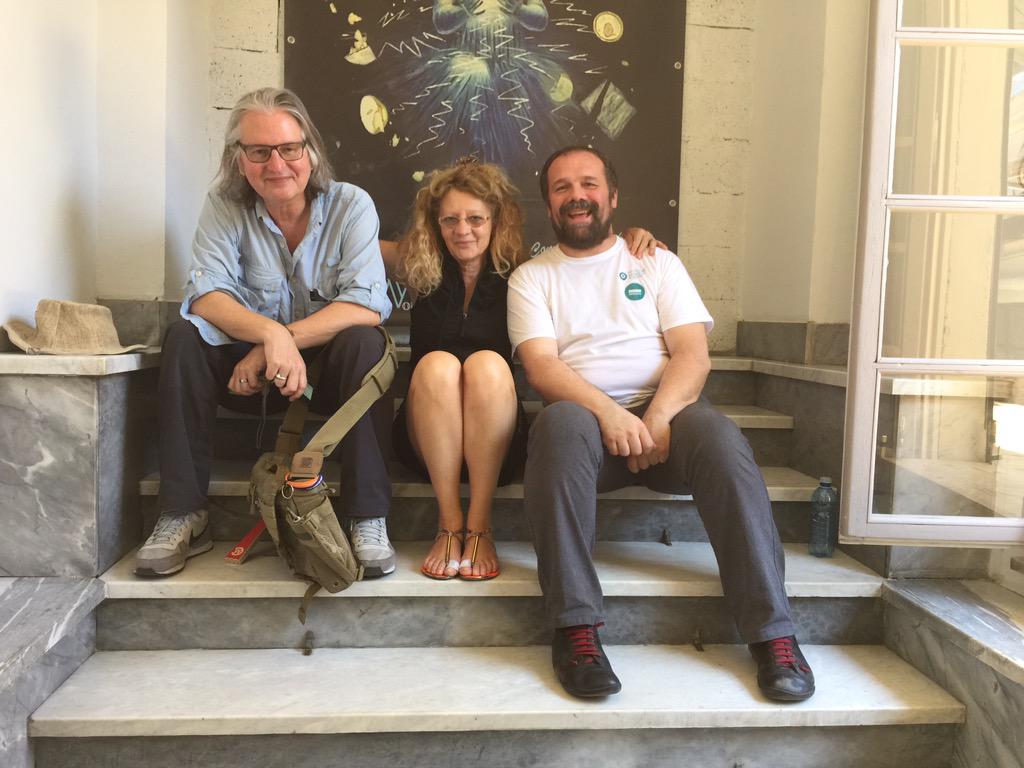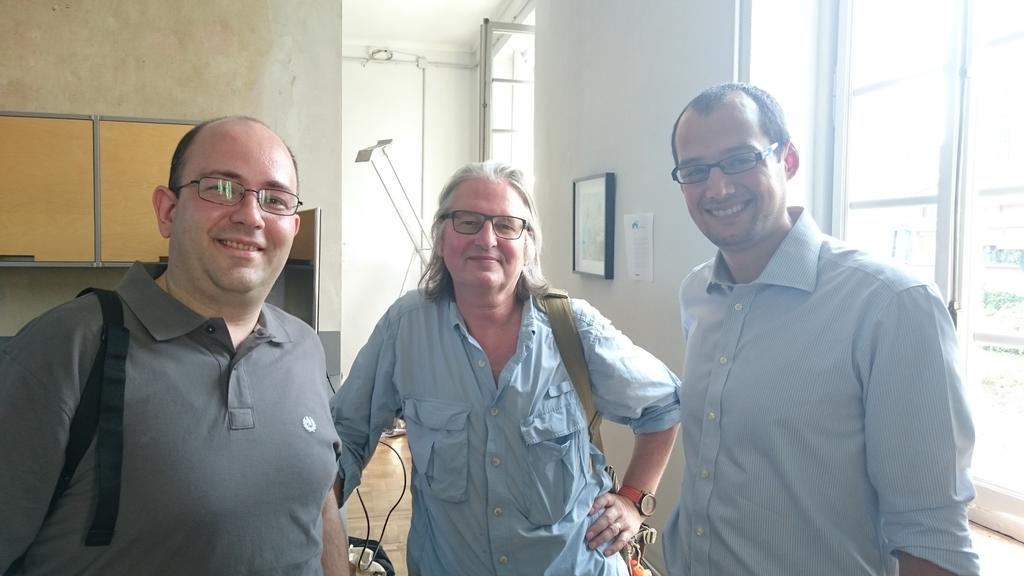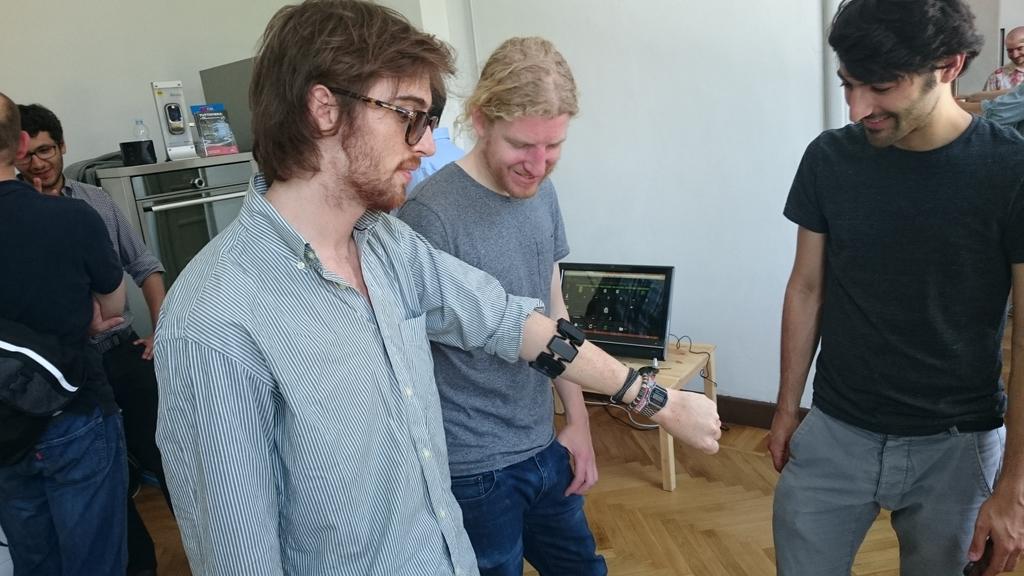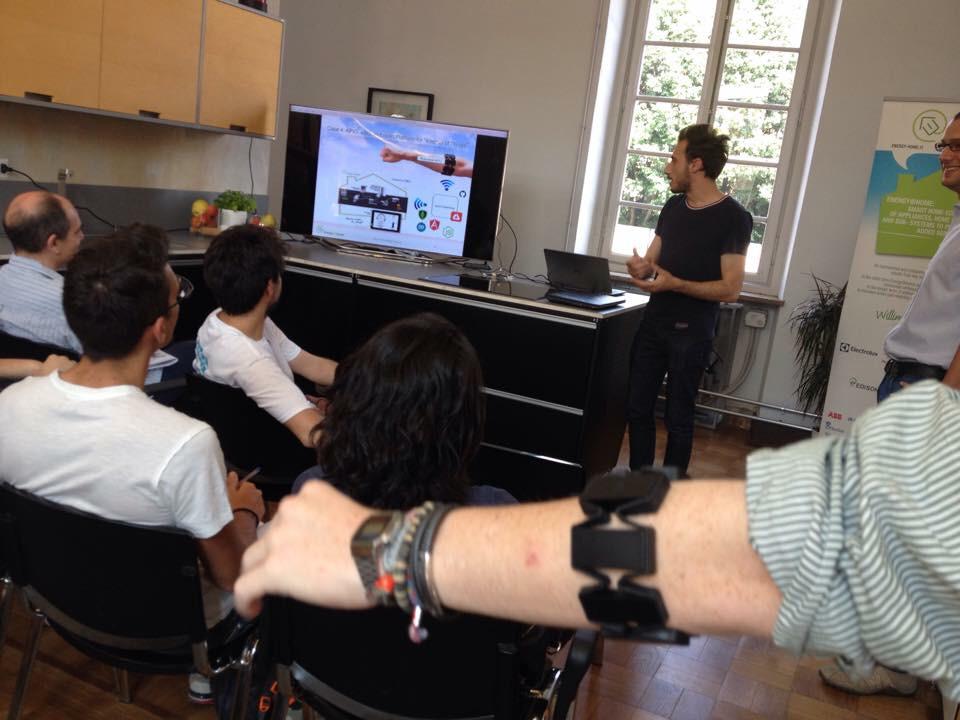A few months back I found an interesting project on Kickstarter: LaMetric. It's a kind-of customizable ambient display - it looks like an alarm clock but you can connect it to the internet.
Cool right ? I immediately pledged into the project so I could get two of those.
The kickstarter campaign went nice and smooth - and finally today I received my devices !!
How could I wait ?
Less than one hour of coding and here my LaMetric showing consumption information from the JEMMA instance installed at my home via the DAL rest interface (I'm luck to have one full Energy@home setup at my place).
I'm currently publishing data from my SmartInfo device - but it should work with any ZigBee metering device, including Smart Plugs. The icon will turn yellow and red if my consumption increases.
Interested in how it works ? here the full code on github: riccardo/py-jemma-lametric-home-consumption.
Riccardo
sabato 17 ottobre 2015
giovedì 18 giugno 2015
How to control your Smart Appliances (and why) with JEMMA & Arduino Yùn (held at Casa Jasmina)
We just published on SlideShare some slides which has been presented to a group of makers at the Torino Mini Maker Faire 2015.
The location was quite special - the kitchen of Casa Jasmina - a really visionary and interesting project. A great opportunity to meet and listen to real IoT and Technology legends such as Bruce Sterling, Jasmina Tesanovic (does the name sounds familiar ?) and Arduino's dad Massimo Banzi.
The slides include a walk-through tutorial which shows how to make a very simple button using an Arduino Yun and configure it to control Smart Appliances compatible with the Energy@home eco-system (full code available here). In the tutorial we also shortly presented how to call the JEMMA DAL API via Javascript - using the test environment supplied with JEMMA.
The tutorial has been performed by Riccardo Tomasi (Istituto Superiore Mario Boella - ISMB) and Ivan Grimaldi (Telecom Italia), both members of the Energy@home reference implementation working group and core JEMMA developers.
During the tutorial we also had the opportunity to show some nice examples of project using some JEMMA components, including a nice demo prepared by Danny Noferi and his colleagues of the JOL S-CUBE (Milan) which have shown how to interact with appliances using augmented-reality or voice control techniques.
To provide ideas about how some innovative projects are using Smart Appliances today, we also introduced some cases provided by projects (GreenCom, SORRISO, Mas2ering) and shown the demo prepared by APIO to control appliances with gestures - which have been all presented to the herds of visitors which have visited the house all day.
The location was quite special - the kitchen of Casa Jasmina - a really visionary and interesting project. A great opportunity to meet and listen to real IoT and Technology legends such as Bruce Sterling, Jasmina Tesanovic (does the name sounds familiar ?) and Arduino's dad Massimo Banzi.
The slides include a walk-through tutorial which shows how to make a very simple button using an Arduino Yun and configure it to control Smart Appliances compatible with the Energy@home eco-system (full code available here). In the tutorial we also shortly presented how to call the JEMMA DAL API via Javascript - using the test environment supplied with JEMMA.
The tutorial has been performed by Riccardo Tomasi (Istituto Superiore Mario Boella - ISMB) and Ivan Grimaldi (Telecom Italia), both members of the Energy@home reference implementation working group and core JEMMA developers.
During the tutorial we also had the opportunity to show some nice examples of project using some JEMMA components, including a nice demo prepared by Danny Noferi and his colleagues of the JOL S-CUBE (Milan) which have shown how to interact with appliances using augmented-reality or voice control techniques.
To provide ideas about how some innovative projects are using Smart Appliances today, we also introduced some cases provided by projects (GreenCom, SORRISO, Mas2ering) and shown the demo prepared by APIO to control appliances with gestures - which have been all presented to the herds of visitors which have visited the house all day.
mercoledì 19 novembre 2014
JEMMA 0.9 release
The Energy@Home association is proud to announce Version 0.9 of the JEMMA framework.
This release contains a lot's of bug fixes and improvements in the ZigBee network management as well as in the GUI (/demo/).
This version adds support for DoorLock (YALE, KWIKSET) and WindowCovering (UBISYS) devices.
The release binaries also includes OSGi Device Abstraction Layer implementation (rfc0196 and rfc0210).
You can interact with the OSGi Device Abstraction Layer also using HTTP REST and WebSocket.
Take a look at this page to understand how to interact with REST APIs and to this page to find out what kind of functions (with operations and parameters) are exposed by JEMMA devices.
This release will be used during the "Smart Home Hackathon" (http://gnammo.com/events/1657/smart-home-hackathon) which will take place at the I3P (from November 21 November 23)
Download JEMMA 0.9
Run JEMMA with a FlexKey
This release contains a lot's of bug fixes and improvements in the ZigBee network management as well as in the GUI (/demo/).
This version adds support for DoorLock (YALE, KWIKSET) and WindowCovering (UBISYS) devices.
The release binaries also includes OSGi Device Abstraction Layer implementation (rfc0196 and rfc0210).
You can interact with the OSGi Device Abstraction Layer also using HTTP REST and WebSocket.
Take a look at this page to understand how to interact with REST APIs and to this page to find out what kind of functions (with operations and parameters) are exposed by JEMMA devices.
This release will be used during the "Smart Home Hackathon" (http://gnammo.com/events/1657/smart-home-hackathon) which will take place at the I3P (from November 21 November 23)
Download JEMMA 0.9
Run JEMMA with a FlexKey
mercoledì 23 luglio 2014
New JEMMA on Raspberry PI available
Dear all,
We are happy to annonunce that a new JEMMA on Raspberry PI (for beginners) has been created on here the JEMMA Wiki.
Thanks to Fabio a.k.a. Tinwor for preparing it.
Riccardo
We are happy to annonunce that a new JEMMA on Raspberry PI (for beginners) has been created on here the JEMMA Wiki.
Thanks to Fabio a.k.a. Tinwor for preparing it.
Riccardo
lunedì 19 maggio 2014
Energy@home releases JEMMA v0.2 at M2MForum 2014
The M2MForum is one of the most important European exhibitions devoted to the machine-to-machine communication and Internet of Things. This year, Energy@home will be one of the main exhibitors presenting its news and achievements with a booth and a workshop.
As you can see from the picture, the Energy@home demo has safely traveled from its usual location in ISMB Laboratories in Torino to the location of the exhibition, where it will be used to showcase the main use cases and features of the Energy@home specifications.
During the event, the most recent findings and news from Energy@home will be also presented during a dedicated workshop named "Valuing the demand side flexibility through a Smart Home communication infrastructure".
During the workshop, the latest and upcoming JEMMA evolutions will be also presented in a dedicated session (Open eco-systems for Smart M2M applications at Home : experiences and future developments of the JEMMA project).
In conjunction with the event, Energy@home is also proud to announce the release the latest version of JEMMA (v0.2). This version includes a number of new features including a new administrative GUI for developers and administrators (Java GAL GUI), support for new bitron home devices, beyond a full clean-up/review of the logging messages (currently released only in the logging_refactoring branch - to be soon merged with master in version v0.2.1).
This will be the last "full" release without major structural changes from the original pre-open-source code base of JEMMA. Right after the event we will start an analysis/re-factoring sprint to improve the design of JEMMA based on the lessons learned that we collected in the first 8 months of life of the project, and which will help us transitioning towards version v0.9 - tentatively set for October 2014.
More information here.
As you can see from the picture, the Energy@home demo has safely traveled from its usual location in ISMB Laboratories in Torino to the location of the exhibition, where it will be used to showcase the main use cases and features of the Energy@home specifications.
During the event, the most recent findings and news from Energy@home will be also presented during a dedicated workshop named "Valuing the demand side flexibility through a Smart Home communication infrastructure".
During the workshop, the latest and upcoming JEMMA evolutions will be also presented in a dedicated session (Open eco-systems for Smart M2M applications at Home : experiences and future developments of the JEMMA project).
In conjunction with the event, Energy@home is also proud to announce the release the latest version of JEMMA (v0.2). This version includes a number of new features including a new administrative GUI for developers and administrators (Java GAL GUI), support for new bitron home devices, beyond a full clean-up/review of the logging messages (currently released only in the logging_refactoring branch - to be soon merged with master in version v0.2.1).
This will be the last "full" release without major structural changes from the original pre-open-source code base of JEMMA. Right after the event we will start an analysis/re-factoring sprint to improve the design of JEMMA based on the lessons learned that we collected in the first 8 months of life of the project, and which will help us transitioning towards version v0.9 - tentatively set for October 2014.
More information here.
lunedì 3 febbraio 2014
JEMMA 0.1.0 released
We are happy to announce the release of JEMMA version 0.1.0.
This version includes several contributions by members of the Energy@home association (especially Telecom Italia) and represent an important step to allow the different teams of developers using JEMMA to work on the same code base.
It also includes a fully new component i.e. the "Java GAL" , a platform-independent version of the GAL (Gateway Abstraction Layer).
Main features:
This version includes several contributions by members of the Energy@home association (especially Telecom Italia) and represent an important step to allow the different teams of developers using JEMMA to work on the same code base.
It also includes a fully new component i.e. the "Java GAL" , a platform-independent version of the GAL (Gateway Abstraction Layer).
Main features:
- Inclusion of the main Energy@home "demo" branch
- Integrated "2.0" branch into master
- Added JavaGAL and JavaGAL rest
- Separated web GUI bundles (eKitchen and demo)
- Bug-fixes
The full source code of the new version can be checked out from our GitHub page. More details on the 0.1 release page.
What's next ?
The current version is now available to all partners and contributors to allow finding and solving any eventual bugs. Hot-fixes or performance improvements (if any) might be released in the 0.1.x version thread.
The planning for the next release 0.2 has already started within Energy@home. You can join the discussion or propose new features by contacting us.
lunedì 18 novembre 2013
JEMMA: One Month After
A lot of development has occurred since the first JEMMA release at the EU Utility Week in Amsterdam. A number of developments have already been staged in Milestone 0.1 and several others are being discussed for inclusion in the development road-map.
We are very happy with the feedback we got from early adopters and we have perceived an increasing interest (and great expectations) by several industries, organizations, universities and developers interested in using or eventually extending JEMMA.
We are thus launching two initiatives to increase awareness and foster communication among developers and interested people.
We are very happy with the feedback we got from early adopters and we have perceived an increasing interest (and great expectations) by several industries, organizations, universities and developers interested in using or eventually extending JEMMA.
We are thus launching two initiatives to increase awareness and foster communication among developers and interested people.
- The Energy@home association, which uses JEMMA as its reference implementation, is about to launch a dedicated Working Group to help ensuring that the open specifications produced by associations are rapidly and harmonically implemented in JEMMA. The activities of the WG will start officially in December, involving representatives for partners of the association.
- We are also officially launching the activities on the JEMMA General Mailing list, which now includes all the active developers and contributors. All interested users and developers are welcome to make questions, get help from other users or to discuss the future directions of the framework. Join us !
Riccardo
Iscriviti a:
Post (Atom)










